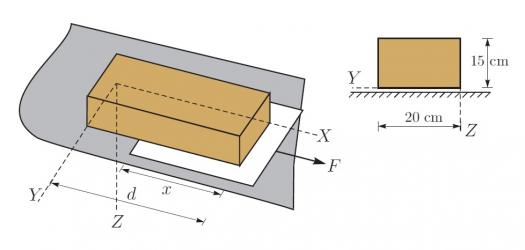Engineering Mehcanics - Friction
Hello,
I am writing because I have a problem that I can not solve.
I would be thankul if someone could help me solve this problem.
The problem is as follows:
Between the box of weight 50N and the surface there is a sheet of paper. The sheet of paper is pulled in a horizontal direction.
The coefficient of friction between the box and the surface is k=0.3 . The coefficient of friction between the sheet of paper and the surface is k=0.3 . The coefficient of friction between the box and the sheet of paper is k=0.4 .
Determine the largest value of X so that when we pull the sheet of paper we do not pull the box along.
Determine the force at the moment when we start to pull, and the force at the moment when the paper is pulled out. Details: d= 35 cm .



As far as I can recall,
As far as I can recall, coefficient of friction is an empirical value derived from experiments, it is generally independent from area of contact. Here your problem seemed to be dependent to area of 20x between the paper and the box and between the paper and the surface; also looks like dependent to the area of 20(Z - x) which is between the box and the surface. These area dependencies leads me to think that you have more advance problem at hand.
My first impression though is that x do not matter here but it is the other way around. Meaning, what is the largest force F not to pull the box along and it doesn't matter what is x. I did not do any calculations yet so I maybe wrong or maybe right.